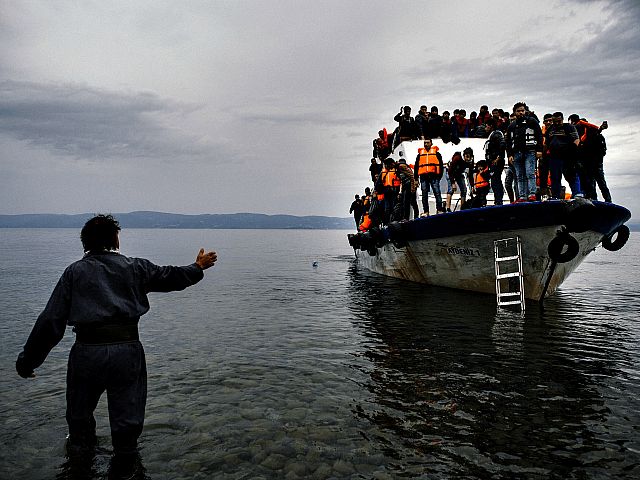Illegal migrant sea crossings to Italy are up 57 per cent on 2016 so far, with 1,300 landing in Sicily over the weekend.
Reuters reports that around half a million migrants have made their way to Italy since the beginning of 2014, with a record-breaking 181,000 making landfall in 2016.
Numbers so far indicate that 2017 will mark another all-time high for landings and drownings, with both up on the same period last year.
Sicily’s latest arrivals were picked up on two ships, one from Norway operating on behalf of the European Border and Coast Guard Agency (Frontex), and one operating on behalf of an NGO named Proactivia Open Arms.
NGOs like Proactivia Open Arms have been accused of becoming an “indispensable” part of the people-smuggling industry by the think tank GEFIRA. The organisation states NGO vessels pick up migrants from smuggler boats just outside Libyan waters and, rather than taking them to safe Tunisian ports nearby, bring them to Italian Coast Guard vessels which will transport them to Europe.
Consequently, GEFIRA argues “these operations cannot be classified as genuine rescue operations”, and has called for their prosecution.

Source: GEFIRA
Frontex chief Fabrice Leggeri claims that around 40 per cent of migrants arriving in Italy are transported by NGO vessels, and has also accused them of acting “like taxis” for people-smugglers.
“[W]e must avoid supporting the business of criminal networks and traffickers in Libya through European vessels picking up migrants ever closer to the Libyan coast,” he said. “This leads traffickers to force even more migrants onto unseaworthy boats with insufficient water and fuel than in previous years.”
However, the Frontex agency has previously confessed that “all parties involved in [search-and-rescue] operations”, including itself, “unintentionally help criminals achieve their objectives at minimum cost [and] strengthen their business model by increasing the chances of success”.
Despite an admission that its current approach is encouraging people-smugglers and increasing drowning deaths, the agency has said it will not change its tactics in the Mediterranean Sea “because they stem from European values”.
This contrasts sharply with the “tough love” approach to illegal sea crossings adopted by Australia, which sees all incoming vessels intercepted at sea and removed to their port of origin or a third-country processing centre.
The deterrent effect of this strategy has prevented any illegal crossings for over 900 days. Tony Abbott, the former prime minister who introduced it, advised EU leaders in September 2016 that “if you want to stop the deaths [and] you want to stop the drownings, you have got to stop the boats”.
“Effective border protection is not for the squeamish, but it is absolutely necessary to save lives and to preserve nations. The truly compassionate thing to do is: stop the boats and stop the deaths.”
